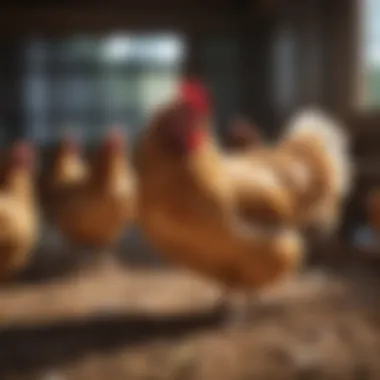Comprehensive Guide to Preventing Chickens from Eating Eggs


Intro
Chickens are remarkable creatures, but some behaviors can pose challenges to owners. One such behavior is egg consumption, where hens eat their own eggs. This issue is not only distressing to observe but can also result in decreased egg production and overall flock health. Understanding the causes of this behavior is crucial for prevention. This guide explores various strategies to keep hens from consuming their eggs while promoting their well-being.
Understanding Egg Consumption
Before diving into prevention techniques, it is essential to understand why chickens might develop this behavior. Several factors contribute to egg consumption in chickens, including nutritional deficiencies, stress, boredom, and habit formation. Addressing these underlying issues is the first step in effectively preventing this behavior.
Potential Solutions
There are numerous strategies that poultry owners can implement to deter hens from consuming their own eggs. Here are some effective methods:
- Nutritional Adjustments: Ensuring a balanced diet rich in calcium and protein can minimize the urge to peck at eggs. Use layer feeds formulated for egg-laying hens.
- Environmental Enrichment: Engaging chickens with toys and foraging activities can prevent boredom. Consider adding dust baths or other natural elements to their living space.
- Providing Adequate Space: Overcrowded conditions can lead to heightened stress levels. Ensure chickens have enough room to roam freely.
- Regular Egg Collection: Frequently collecting eggs helps reduce the opportunity for hens to develop the habit of eating them. This practice should be done multiple times a day, especially in the early morning.
- Using Decoy Eggs: Some owners have success with decoy eggs, such as golf balls or ceramic eggs, to disillusion hens from pecking at real eggs.
Implementing these solutions can significantly reduce the likelihood of egg consumption. Monitoring the flock regularly will also help in identifying any ongoing issues promptly.
Finale
Preventing egg consumption in chickens requires a comprehensive understanding of the behavior and its causes. By adjusting nutrition, providing an enriched environment, managing space, and practicing proactive egg collection, poultry owners can enhance the well-being of their chickens. It is essential to remain observant and responsive to changes within the flock to ensure a healthy poultry environment.
Understanding the Behavior of Chickens
Understanding the behavior of chickens is crucial for anyone aiming to maintain a healthy and productive flock. This section highlights the innate tendencies of chickens, particularly regarding egg consumption. By comprehending these behaviors, poultry owners can implement effective measures to prevent unwanted egg-eating incidents. Learning the reasons behind chickens' actions helps create a more harmonious environment that fosters their well-being. Each chicken is unique, and understanding their behavioral patterns is a key step to successful flock management.
Innate Egg-eating Behaviors
Chickens have certain innate behaviors that can sometimes lead to egg consumption. Egg-eating can emerge from a variety of factors such as instinctual lessons learned from other chickens or opportunistic feeding. Once a chicken starts eating eggs, it might pass that behavior to others in the flock, exacerbating the issue.
Chickens are naturally curious. They may peck at an egg out of investigation, especially if it is cracked or damaged. If they discover the egg is edible, they may start eating them regularly. As a result, owners must remain vigilant and aware of these natural tendencies to intervene before habits form.
Factors Influencing Egg Consumption
Several factors can influence the likelihood that a chicken will consume its own eggs. Understanding these influences is vital in the prevention of egg-eating behavior.
- Nutritional Deficiencies: A lack of vital nutrients can lead chickens to seek out alternative food sources, including their own eggs. A balanced diet rich in calcium, protein, and vitamins is crucial for overall health and egg production.
- Stress and Environmental Factors: Stress is a significant contributor to egg-eating behavior. Changes in the environment, overcrowding, or aggression from other flock members can create a stressful atmosphere. Providing a comfortable and stable living space is essential for reducing stress levels.
- Social Hierarchy and Dominance: Chickens operate within a social structure known as the pecking order. Dominant chickens may bully or intimidate others, which can lead to changes in behavior, including egg eating. Understanding these dynamics can aid in managing the flock effectively.
By addressing these factors and understanding the underlying causes of egg consumption, poultry owners can establish a proactive approach to maintaining flock health.
Identifying the Causes of Egg Eating
Understanding why chickens eat their own eggs is crucial for poultry owners. Recognizing the underlying issues can lead to effective interventions and prevention strategies. Identifying the causes of egg eating helps in tackling the problem at its root, rather than just addressing the symptoms. With proper knowledge, owners can create a better living environment, enhance flock health, and promote the overall well-being of their chickens.
Nutritional Deficiencies
Nutritional deficiencies can lead to behaviors such as egg eating in chickens. When hens lack essential nutrients, they may turn to eggs as an alternate source of nutrition. Common deficiencies include a lack of calcium, protein, and other vitamins.
Key nutrients to focus on:
- Calcium: Necessary for eggshell formation. Insufficient calcium can result in thin or broken shells, prompting the hens to consume them.
- Protein: Aids in overall health. Low protein diets may cause hunger and lead to egg eating behaviors.
- Vitamins and minerals: Vitamins A, D, and E, along with minerals like phosphorus, are essential for proper chicken health.
To prevent these deficiencies, ensure that your chickens have access to a balanced diet, including high-quality feed and appropriate supplements. Regular monitoring of their diet and adjusting as necessary can prevent the onset of egg-eating behaviors.
Stress and Environmental Factors
Chickens are sensitive to their environment. Stressful situations can lead to undesirable behaviors, including egg consumption. Factors such as overcrowding, inadequate shelter, and environmental changes can contribute to stress.
Key stress factors include:
- Overcrowding: High chicken density can lead to competition for resources, increasing stress levels.
- Poor shelter: Inadequate protection from elements can create discomfort and anxiety among the flock.
- Changes in routine: Sudden alterations in feeding times or flock composition can upset chickens and lead to egg eating.


To mitigate stress, it is vital to maintain a comfortable environment. Provide enough space, ensure proper shelter, and maintain a consistent routine to help keep the chickens calm and reduce egg-eating tendencies.
Social Hierarchy and Dominance
Chickens naturally establish a social hierarchy known as the pecking order. This ranking can influence behaviors, including the tendency to eat eggs. Dominant birds may intimidate or bully lower-ranked hens, leading to stress and increased likelihood of egg consumption.
Considerations regarding social dynamics include:
- Introducing new chickens: New arrivals can disrupt existing pecking orders and create tension.
- Monitoring aggression: Observe interactions among the flock to identify aggressive behavior that could lead to egg eating.
To address social hierarchy issues, ensure that introductions of new birds are handled carefully. Gradually integrating new chickens can help maintain peace and reduce any negative behaviors, including egg consumption. Regular observations can also provide insight into the needs of the flock and help manage dynamics efficiently.
Understanding the causes of egg eating is vital for effective management. By focusing on nutrition, stress reduction, and social dynamics, owners can create a more harmonious environment for their chickens.
Preventive Measures
Preventive measures are crucial for ensuring that chickens do not engage in egg consumption. Understanding and implementing these measures can lead to a healthier flock and reduced incidences of this behavior. By focusing on nutrition, living environment, and flock dynamics, chicken owners can make significant strides in preventing egg eating behaviors.
Providing Adequate Nutrition
Adequate nutrition plays a vital role in maintaining the overall health of chickens and can directly impact their tendency to eat eggs. A proper diet satisfies their nutritional needs, reducing the chance of them seeking alternative food sources, including their eggs.
Types of Feed
The types of feed offered to chickens can greatly influence their eating habits. A well-balanced feed typically provides essential vitamins and minerals. Layer feed is a popular choice because it contains a higher protein content and necessary nutrients needed for egg production. However, not all feeds are equal. Some feeds may lack specific nutrients leading to deficiencies. Regularly assessing and choosing high-quality feed can benefit overall health and reduce egg-eating tendencies.
Supplements and Additives
Supplements and additives can further enhance the nutritional profile of chicken diets. These products are designed to fill any gaps in essential nutrients. Calcium supplements, for instance, can support the structural integrity of eggshells. Strong eggshells may deter chickens from breaking and eating eggs. However, it is essential to use these additives judiciously. Over-supplementation can lead to imbalances and health issues. Consulting a veterinarian about appropriate supplements is advisable.
Enhancing the Living Environment
The environment in which chickens live significantly impacts their behavior. Creating a comfortable, stimulating living space is essential for hen welfare. A well-designed environment reduces stress, which can be a contributing factor to egg consumption.
Space Requirements
Space requirements are fundamental to maintaining flock health. Providing adequate space reduces aggression and competition among chickens. Crowded conditions can lead to heightened stress levels, increasing the likelihood of egg-eating behavior. Chickens should ideally have enough room to move freely. A minimum of three to five square feet per bird in the coop is recommended. However, more space is often better, as it allows for natural behaviors and interactions.
Stress Reduction Techniques
Implementing stress reduction techniques is also paramount. Chickens are perceptive animals; any stressors in their environment can lead to adverse behaviors. Simple aspects like ensuring comfortable temperatures and protecting them from extreme weather can make a difference. Additionally, providing enrichment tools, such as perches and dust baths, can keep them engaged and distracted from destructive behaviors. Regular observation can help identify stress triggers in the environment.
Managing Flock Dynamics
Flock dynamics contribute greatly to behaviors such as egg consumption. Understanding how chickens interact can help in resolving conflicts and promoting a harmonious environment. Proper management techniques can often prevent aggressive behaviors directed towards eggs.
Introducing New Chickens
Introducing new chickens into an existing flock can be a double-edged sword. On one hand, it can stimulate social interactions; on the other, it can lead to disruptions in established pecking orders. To minimize conflicts, it is wise to quarantine new chickens for a period before introducing them. Gradual introductions can reduce stress and help existing flock members adjust. However, if not managed correctly, introducing new members could amplify competition and lead to increased egg consumption.
Monitoring Pecking Order
Monitoring the pecking order is essential for managing flock dynamics. Chickens have a social hierarchy that governs interactions. Keeping an eye on aggressive behaviors among hens will help in identifying potential troublemakers. If specific chickens are consistently bullying others, they may drive lower-ranking hens to eat eggs out of stress or frustration. Observing interactions regularly allows for interventions when necessary. Ensuring a balanced pecking order contributes to flock stability and reduced egg consumption.
Behavior Modification Strategies
Behavior modification strategies play a crucial role in preventing egg-eating behavior in chickens. This section outlines targeted interventions that address both the immediate problem and the underlying causes of egg consumption. Implementing effective behavior modification techniques not only deters egg eating but also ensures a healthier and more harmonious flock. The focus is on fostering an environment that reduces the impulse to consume eggs through careful management of resources and behavioral cues.
Deterring Egg Eating


Collecting Eggs Regularly
Collecting eggs regularly is an essential practice for poultry owners aiming to stop egg-eating behaviors. When eggs are continuously available, chickens may feel encouraged to consume them out of curiosity or boredom. Regular collection disrupts this cycle by limiting access to the eggs and can decrease the likelihood of chickens developing a taste for them. This simple strategy can significantly reduce the occurrence of egg eating in a backyard setting.
Key characteristics of collecting eggs regularly include:
- Frequency: The more often eggs are collected, the less opportunity chickens have to eat them.
- Timing: Collecting at the same time each day helps establish a routine.
The unique feature of this method is its simplicity and effectiveness. It does not require complex equipment or extensive training. However, some may consider the drawback of time commitment, as regular collection can be inconvenient for busy owners. Despite this, the benefits outweigh the disadvantages, particularly in a small flock.
Providing Alternatives
Providing alternatives to egg consumption can be an effective strategy to distract chickens and reduce the urge to eat eggs. This involves offering various items like kitchen scraps or specially designed chicken treats that satisfy their curiosity and need for pecking. By redirecting their focus, chickens are less likely to engage in unwanted behaviors.
The key characteristic of this approach is its focus on enrichment. Rather than solely preventing egg eating, it promotes a more stimulating environment for chickens. Popular choices include:
- Vegetable scraps: Carrots, greens, and pumpkins.
- Commercial treats: Products designed to offer nutritional value while keeping chickens engaged.
The unique feature of providing alternatives is its behavioral enrichment. While it does add some cost for supplies, the investment can lead to more balanced and well-adjusted birds. However, poultry owners need to be mindful of the amount given to avoid obesity.
Utilizing Egg Laying Boxes
Design and Placement
The design and placement of egg laying boxes play a significant role in the success of preventing egg consumption. Properly constructed boxes that offer comfort and security encourage hens to lay eggs without being drawn into eating them. This strategy is beneficial as it provides a designated space for laying, which can reduce accidental breakage and the subsequent temptation to eat the contents.
Key characteristics of well-designed laying boxes include:
- Size: Large enough for hens to enter comfortably.
- Comfort: Soft bedding that encourages chickens to feel secure while laying.
A unique feature of this strategy is its customizability. Depending on the flock's size and breed, owners can adjust the number and style of nesting boxes. However, poor placement can lead to less use, which is its main disadvantage. Ensuring proper placement in quieter areas can mitigate this issue.
Enhancing Privacy for Laying
Enhancing privacy for laying is another essential aspect of utilizing egg laying boxes. Chickens are more likely to use nesting boxes if they feel safe from disturbances and are provided with a secluded environment. This helps to minimize stress and encourages hens to lay their eggs without interruption.
The key characteristic of this strategy is the provision of solitude. When chickens are shielded from other flock members, they exhibit more natural laying behaviors. Strategies such as installing partitions or using natural barriers can improve the privacy of laying boxes.
The unique feature of enhancing privacy is its impact on overall flock dynamics. By allowing hens to lay undisturbed, the likelihood of stress-related behaviors, including egg eating, is reduced. There are few disadvantages, although some chickens may still compete for the best-hidden spots, which can lead to conflict. Monitoring the situation will help alleviate such issues.
Monitoring and Observing Your Flock
Observing and monitoring chickens plays a crucial role in preventing them from consuming their own eggs. This process helps poultry owners identify troubling behaviors and underlying issues in the flock dynamics. Awareness of these factors allows for timely interventions. Monitoring provides insight into not just egg-eating behaviors but also overall health and well-being.
Behavioral Observations
Identifying Key Indicators
Identifying key indicators is essential in recognizing early signs of egg consumption. Behavioral changes like unusual pecking, vocalizations, or shifting social dynamics are important to note. These indicators highlight the potential for stress or discomfort within the flock, enabling necessary adjustments before egg consumption becomes a habit.
A major benefit of this practice is its proactive approach. It allows owners to intervene before problems escalate. Observing chickens consistently helps to maintain a sense of order in the coop. However, one drawback is that it requires diligence and time—misinterpretation of behaviors can lead to unnecessary reactions.
Understanding Group Dynamics
Understanding group dynamics among chickens is another vital aspect. Chickens have a pecking order that influences their behavior. Recognizing leadership roles and interactions can reveal tension or conflicts that may lead to stress, prompting egg consumption.
The key feature of this observation is its focus on social relationships. Understanding the established hierarchy among the chickens helps owners promote harmony and limit stressors. The drawback of group dynamics observation is the time required to form a clear understanding. Every flock is different, and insights from one group may not apply universally.
Egg Production and Consumption Tracking


Establishing Records
Establishing records of egg production and consumption is a useful practice. Keeping track of the number of eggs laid and consumed helps identify trends over time. This data is invaluable in spotting potential issues early. Regular records promote a data-driven approach to flock management.
A strong characteristic of this practice is its quantitative nature. Numbers provide a clear picture of consumption patterns. However, it demands consistent effort and data entry reliability, which can be a burden for some owners.
Analyzing Patterns
Analyzing patterns in egg laying and consumption is important for comprehensive flock management. Recognizing patterns may indicate nutritional deficiencies, seasonal changes, or other factors influencing the flock's behavior. This analysis helps pinpoint problem areas effectively.
The benefit of analyzing patterns lies in its ability to draw conclusions. By understanding patterns, owners can develop informed strategies to mitigate egg consumption. The downside here is that it requires some expertise in data analysis, which may not be familiar to all poultry owners.
Monitoring and observing your flock provides critical insight into behaviors that can threaten the health of your chickens and the sustainability of egg production.
What to Do if Egg Eating Occurs
Understanding what to do when egg eating occurs is crucial for maintaining the health and productivity of your flock. This behavior can lead to significant issues, including decreased egg production and potential injuries among chickens. Addressing the cause effectively can not only mitigate immediate problems but also lay the groundwork for long-term solutions.
Immediate Interventions
Removing Affected Eggs
Removing affected eggs is an essential step in addressing egg eating. When eggs are consumed, it reinforces the behavior, making it more likely to recur. Regular collection of eggs can dramatically reduce the chances of this occurrence. By promptly removing eggs from the laying area, you prevent chickens from finding and eating them. A key characteristic of this approach is that it requires diligence but is straightforward for most poultry owners.
The unique feature of this method lies in its simplicity; no complex systems or equipment are necessary. However, the challenge is related to time management, as frequent checks are essential to ensure eggs are removed. Maintaining a schedule for egg collection often helps in preventing further egg consumption.
Securing the Laying Area
Securing the laying area is another immediate intervention that plays a vital role in preventing egg eating. Providing chickens with a safe and comfortable space for laying eggs can reduce stress and minimize disturbances, which often lead to this behavior. A well-secured area allows the hens to feel safe during the laying process.
The key characteristic of this method is the physical barriers you can create to limit access to the eggs. By ensuring that the laying boxes are enclosed or protected, you can help prevent chickens from eating each other's eggs. This approach can be very beneficial as it encourages a more stable environment. The downside to this method might include the need for initial investment in materials or construction time, but the long-term benefits of a secure environment usually outweigh these costs.
Long-term Solutions
Behavioral Reconditioning
Behavioral reconditioning focuses on changing the patterns of egg eating. This involves retraining chickens to discourage this behavior through various tactics. Implementing positive reinforcement can help transform the pecking habit of consuming eggs into more desirable behaviors, such as foraging or exploring.
A key characteristic of behavioral reconditioning is its ability to provide sustainable results over time. It creates a more harmonious flock dynamic. However, it can require patience and consistency; not all chickens will respond the same way, and some may need more time to adjust.
Revising Husbandry Practices
Revising husbandry practices entails assessing and modifying management strategies to improve overall chicken welfare. This can include adjustments to nutrition, housing, and social structures within the flock. By ensuring that chickens are well-fed and comfortable, the likelihood of egg eating can significantly decrease.
The distinct feature of revising husbandry practices is its holistic approach; it considers multiple factors that contribute to the health of chickens. However, this technique requires a thorough understanding of poultry management. The advantage here is that it combines prevention with fostering a better environment for the chickens, greatly enhancing well-being in the long run.
Addressing egg eating with immediate interventions and long-term strategies leads to a healthier flock overall. Hens thrive in stable environments, where they feel secure and well cared for.
Ending
The issue of egg consumption in chickens is more than just a mere curiosity; it represents a significant concern for poultry owners who aim to maintain healthy and productive flocks. Understanding the factors leading to this behavior is crucial for successful management. As outlined in this article, a combination of environmental, nutritional, and behavioral strategies is needed to prevent egg eating effectively.
Implementing preventive measures, such as providing balanced nutrition and managing flock dynamics, can greatly mitigate the likelihood of hens consuming their own eggs. Regular observation of flock behavior also plays a critical role. Monitoring actions like pecking order and stress indicators allows for timely interventions when problems arise.
Through careful management and a proactive approach, chicken owners can enhance their flock's quality of life and productivity, ensuring that egg consumption remains where it should be: in the nest, laid out as a harvest of their chickens' hard work.
Summary of Key Points
- Understanding Behavior: Innate behaviors and external factors contribute to egg consumption in chickens.
- Identifying Causes: Nutritional deficiencies, stress, and social hierarchies are significant causes that need attention.
- Preventive Measures: Adequate nutrition, improved environments, and careful flock management can prevent egg eating.
- Behavior Modification: Regular egg collection and use of appropriate laying boxes can help deter the behavior.
- Monitoring and Observation: Keeping detailed records and observing interactions aid in understanding flock dynamics.
- Responsive Interventions: Immediate and long-term solutions can be implemented when egg consumption is noted.
Future Considerations for Poultry Owners
As poultry farming evolves, it is vital for owners to remain updated on best practices regarding chicken welfare. Future research may reveal new insights into the complex behaviors of chickens, providing further strategies to mitigate egg consumption. Ongoing education about poultry nutrition and behavior directly benefits flock health.
Owners should also network with other poultry enthusiasts to share experiences and solutions. Online platforms such as Reddit and Facebook groups dedicated to poultry farming are valuable for exchanging tips and monitoring trends in chicken care.
Ultimately, investing in continuous improvement and adapting to new information will ensure that poultry owners can maintain a productive and healthy flock. Remember, addressing egg consumption involves an integrated approach that includes education, observation, and proactive management.







